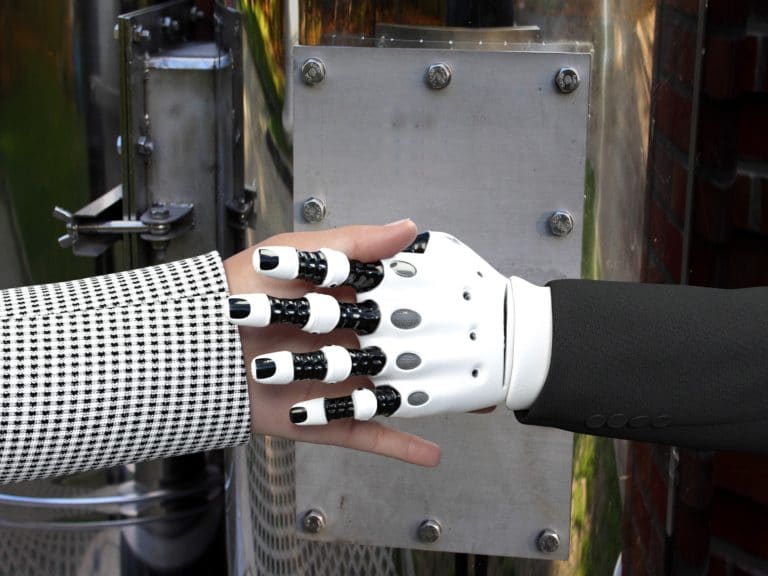Theology for Millennials: Algor – Ethics
On Artificial Intelligence

In “Theology for Millennial,” Mexican Father Mario Arroyo Martinez shares with Exaudi’s readers his article entitled “Algor – Ethics,” in which he reflects on the current debate on Artificial Intelligence.
* * *
The topic of Artificial Intelligence (AI) is a red-hot issue. Disquieting, for example, are the dystopian panoramas that Yuval Noah Harari describes in his trilogy (especially in Homo Deus) on the future or, rather, the end of humanity, caused by AI out of control.
The importance of the problem has also permeated the Vatican halls and the Pontifical Academy for Life — together with Microsoft, IBM and FAO –, signed a Document approved by Pope Francis about it. It is entitled “Rome Calls for AI Ethics, February 28, 2020). Although incipient, it’s an important step in face of a great, not extendable subject of our time.
More than a year after its publication, it has not lost any of its topicality. On the contrary, a broader synergy has been sought which will also be useful as a tool for inter-religious dialogue, involving representatives of the other monotheist religions — Jews and Muslims –, to reflect on it.
In November 2020, Pope Francis chose the ethics of AI as his monthly prayer intention (“Let us pray that robotic progress and Artificial Intelligence is always at the service of the human being” ) and he made a thought-provoking video on the subject.
As with every human activity, AI must not be subtracted from the ethical perspective. It has the character of a means; a very powerful means to change the world and our lives. It is up to us to direct it, so that it is for the good of humanity and not to its detriment.
Now, finding ourselves at the dawn of this development, because it’s called to grow in a very accelerated way – we are still in time to take decisions and channel the research, putting certain locks on them so that they will in fact serve and not supplant humanity.
The moral recommendations the Document gives are very general; however, it’s a first timid but necessary step in the right direction. “For technological advance to be aligned with the true progress of the human race and respect for the planet,” it must comply with a series of requirements, namely: “include all human beings, without discriminating anyone; it must have the good of humanity and the good of every human being at heart . . . ; it must be conscious of the complex reality of our ecosystem and be characterized by the way it cares for and protects the planet . . . Moreover, every person must be aware that they are interacting with a machine.”
In fact, the Pope points out in his video that if “technological progress increases inequalities it’s not real progress.” In other words, we must all benefit from AI. It must not be an instrument to segregate a part of the population — generally the poorest and most marginalized.
However, it must not be thought that the problem of AI is addressed from an exclusively preventive perspective, with a marked negative hue. On the contrary, it is also addressed with a hopeful perspective, as it’s expected that in 20050 we will be ten billion human beings and, only thanks to AI, will it be possible to feed us all. So, like all human activity, it has its pros and cons, but it calls urgently to take action on the matter before it slips from our hands.
The document ends by defining the “algor-ethics” according to the following principles:
- “ Transparency: The principles of AI must be explainable;
- Inclusion: they must take into account the needs of all human beings;
- Responsibility: those that design and implement AI must proceed responsibly;
- Impartiality: not act according to prejudices, thus safeguarding equity and dignity;
- Reliability;
- Security and privacy.”
As can be observed, just by enunciating them one sees that there is still much to be done, or that it is an ideal aspiration. It doesn’t matter, it’s necessary to have the end clear, where we want to reach, how we want to live before the very vertiginous changes of our technology invert the meaning, and instead of it being at our service, we become obsolete in face of it. We still have time to avoid having Harari’s dark prophecies become a reality.
Translation by Virginia M. Forrester
Related

The Five (5) “C’s” of PonCe
Exaudi Staff
04 April, 2025
4 min

The Lies of Love: Debunking Myths and Rediscovering the True Meaning of Love
José María Contreras
04 April, 2025
1 min

Family and Mental Health: Parents’ Secret Superpower for Raising Happy Children
Laetare
04 April, 2025
3 min

Cardinal Arizmendi: Let Money Not Rule Us
Felipe Arizmendi
03 April, 2025
4 min
 (EN)
(EN)
 (ES)
(ES)
 (IT)
(IT)

